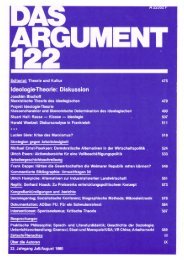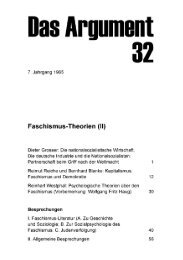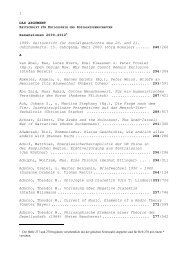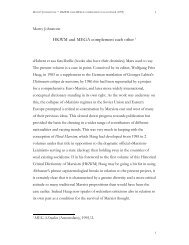das argument - Berliner Institut für kritische Theorie eV
das argument - Berliner Institut für kritische Theorie eV
das argument - Berliner Institut für kritische Theorie eV
Erfolgreiche ePaper selbst erstellen
Machen Sie aus Ihren PDF Publikationen ein blätterbares Flipbook mit unserer einzigartigen Google optimierten e-Paper Software.
XIV<br />
Summaries<br />
Joachim Radkau: The Ambiguity of Capital versus Fascism<br />
The comparison between German and Italien Fascism is an approach of wh ich too little use<br />
has been made until now; theoretical framework which can encompass the masses of empirical<br />
data discovered in the course of recent decades still remains to be worked out. This approach<br />
is appropriate as a means of preventing a too deterministic view of the development towards<br />
Fascism and an over-ambitious concept of its identity. An idea of Fascism arises via this approach<br />
as a phenomenon possessing deep-roated contradictions stemming from long-term<br />
characteristics of capitalism. The comparison between Germany and Italy particularly throws<br />
light on the role of agrarian capitalism at the beginning of the Fascist movements.<br />
Jost Hermand: All Power to the Women. Fascist Concepts of Matriarchy<br />
Although German Fascism was basically a strictly patriarchal ideology which emphazised<br />
male leadership on all levels, it also utilized certain parts of older theories of matriarchy, especially<br />
in the field of eugenics. The Nazis were able to do this by making selective and tendentious<br />
use of concepts first advanced by Bachofen and later appropriated by Klages, Schuler,<br />
Baeumler and Bergmann, representatives of the neo-conservative movement of the 1920's.<br />
Various views by leaders of Nazi women's organisations are also presented.<br />
Jan Rehmann: The Churches and German Fascism<br />
At the end of the Weimar Republic the churches hoped that the religios instance would become<br />
dominant within ideological socialisation. Hitler promised them the reinforcement of<br />
ecclesiastical positions in the societil civile. The success of this church policy cannot be explained<br />
by mere demagogical manipulation, but lies in the hegemonial intervention into the<br />
normal ideological functioning of the church. The church resistance first began as the government<br />
abandoned its hegemonial church policy. The resistance of Catholicism is widely interc1assistic<br />
and therefore developped an important popular power. The specific achievement of<br />
the Protestant resistance lies in the ideological reorientation within the bourgeoisie: the radical<br />
wing of the »Bekennende Kirche« c1aimed the exclusive subjection under the Holy Scriptures<br />
and cut off connections to other ideological state powers. After 1945 this »fanatism« was considered<br />
dangerous to the normal ideological functioning of bourgeois society.<br />
Johannes Weyer: Sociology in Fascism. A Iiterary review<br />
In the last few years, the fascist per iod has been rediscovered by West German historians of<br />
Sociology. On the one hand, knowledge about the ideologically affirmative character of an<br />
adjusted sociology is constantly growing - a sociology by the way which has never been suppressed<br />
at all. On the other hand Schelsky et al. are trying to rehabilitate the traditions of the<br />
so called »Leipziger Schule« (Hans Freyer et al.) and utilize them for modern sociology.<br />
Frieder O. Wolf: Chances of Success and Illusions of »Green« Economic Policy<br />
It is tried to determine what are the specific problematics of a »green« economic policy in an<br />
extra-statal (and not antistatist) perspective. For that purpose, the movement-generated concepts<br />
of »getting out« (of the system) and of »decentralization« are criticized. The thesis ist<br />
argued, that economic policy in a green perspective ist not an object of pragmatic »realpolitics«,<br />
but of an ideological struggle that includes acting for real changes within the present<br />
system of growth, domination and exploitation.<br />
Peter Heller and Anne Seyfferth: <strong>Theorie</strong>s and Strategies of Ecological Economy<br />
The Ecological view of economics has recently gained considerable regard, both on a theoretical<br />
and a political level. The essay outlines three major aspects: the linkage of economic development<br />
and preservation of nature; the shaping of an economic-ecological system between<br />
state, market, and underground economy; the approach of environmental ethics to new ways<br />
of economic and social conduct. Finally, the authors give a short report on their project »Labour<br />
in ecologic economy«, implemented at the <strong>Institut</strong>e of Applied Ecology, Freiburg.

















